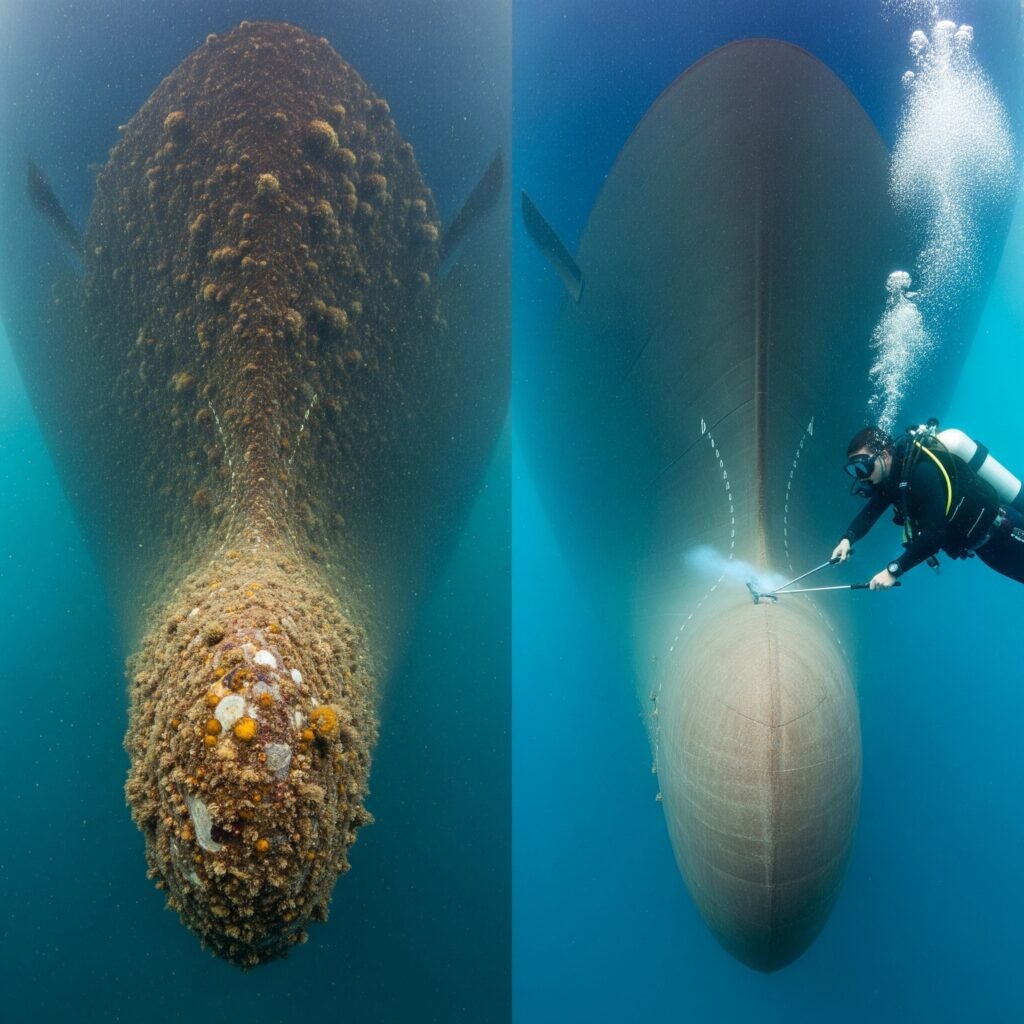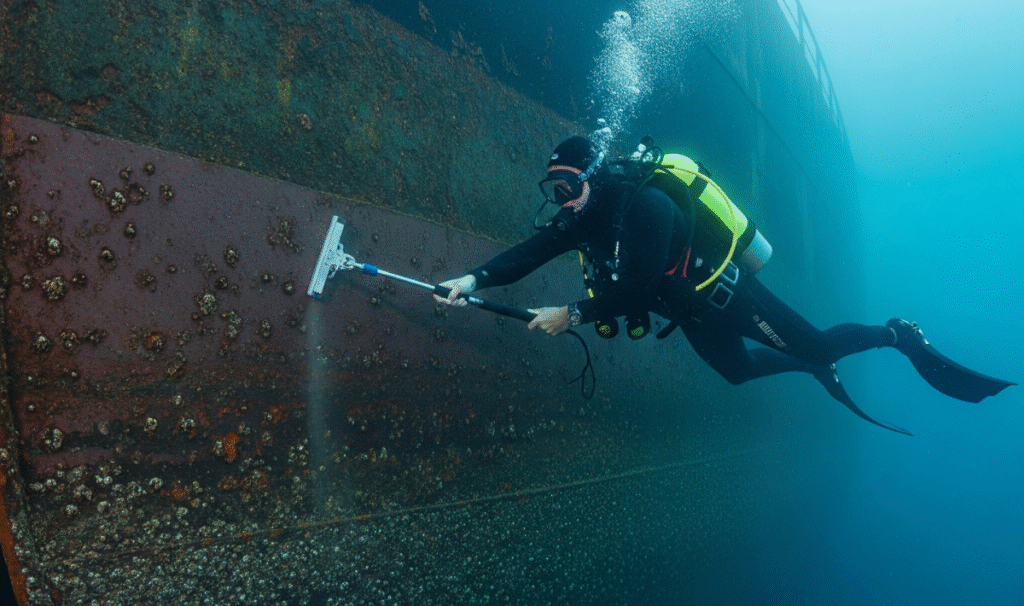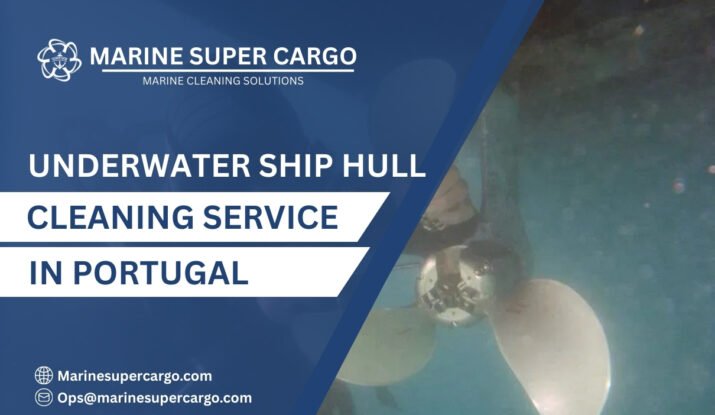Portugal has always been a seafaring nation. From the days of explorers like Vasco da Gama to today’s bustling maritime trade, its ports have remained gateways between Europe, Africa, and the Americas. With strategic locations such as Lisbon, Sines, and Leixões, Portugal handles thousands of ships every year.
But there’s a less glamorous challenge that every ship faces: biofouling. Beneath the waterline, barnacles, algae, and other marine hitchhikers attach themselves to hulls. It might sound harmless, but in practice, it’s a costly, risky, and polluting issue. That’s why underwater ship hull cleaning in Portugal has become a must for operators.
This isn’t just about polishing a hull—it’s about efficiency, safety, and protecting the environment. Let’s dive into the underwater ship hull cleaning in Portugal.
What is Underwater Ship Hull Cleaning in Portugal?
Think of a ship’s hull as an athlete’s body suit—designed to slice smoothly through water. Now imagine that suit covered in barnacles and slime. Each move becomes slower and more exhausting. Ships experience the same drag when fouling builds up over time.
Underwater ship hull cleaning in Portugal is the process of sending divers or robotic cleaners below the waterline to remove these unwanted layers. Brushes, scrapers, or cavitation jets are used—carefully chosen to protect coatings while restoring the hull to peak condition.
Understanding the Drag Created by Biofouling
Biofouling increases friction. More resistance means engines work harder, consuming significantly more fuel. According to marine studies, fouled hulls can increase fuel use by 15–40%. For global shipping companies, fuel is one of the biggest expenses, making clean hulls a financial necessity.

Fuel and Profitability Advantages of a Clean Hull
With underwater ship hull cleaning in Portugal, drag decreases and vessels regain efficiency. This leads to faster voyages, reduced fuel bills, and improved bottom lines. For ships passing through Portuguese ports, cleaning while docked makes perfect sense—costs are recouped quickly in fuel savings alone.
Corrosion Risks and Preventive Maintenance
Marine organisms are more than freeloaders—they accelerate corrosion. Algae and barnacles trap moisture against hulls, breaking down coatings and eating into steel. Left unchecked, corrosion shortens a vessel’s lifespan by years.
Routine underwater ship hull cleaning in Portugal prevents this deterioration, protecting hull structures and extending vessel durability. Just like regular medical check-ups prolong life, hull cleaning prolongs ship health.
Global Standards and Inspection Readiness
The IMO enforces strict safety inspections worldwide. Ships arriving with fouled hulls risk failing checks, facing costly port delays, or even penalties. MARPOL conventions also restrict pollution, including biofouling spread.
By maintaining clean hulls in Portugal, operators comply with these standards, ensuring vessels remain inspection-ready at all times.
Reducing Greenhouse Gas Emissions
Cleaner hulls burn less fuel, which directly reduces carbon emissions. According to imo.org, shipping produces nearly 3% of global CO₂ emissions. Regular underwater ship hull cleaning in Portugal supports global climate commitments while improving fuel efficiency.
Avoiding the Spread of Invasive Species
The MARPOL Convention highlights the risks of invasive species transported on hulls. In Portuguese waters, the introduction of non-native organisms could upset fragile Atlantic ecosystems. By cleaning hulls properly, shipowners prevent invasive species from threatening biodiversity.
Strategic Atlantic Gateway
Sitting at the western edge of Europe, Portugal connects to major Atlantic trade routes between Europe, Africa, and the Americas. Ships already stopping in ports like Sines or Lisbon can easily schedule hull maintenance. Underwater ship hull cleaning in Portugal ensures optimal performance for long transatlantic journeys.
Marine Expertise and Port Facilities
Portuguese ports are equipped with skilled divers and modern marine infrastructure aligned with guidelines from imca-int.com and iaphworldports.org. This combination ensures ships receive internationally competitive hull-cleaning services.
How the Hull Cleaning Process Works in Portugal
Step-by-Step Approach
- Inspection – Divers and sometimes ROVs assess fouling levels.
- Cleaning Stage – Brushes, jets, or robotic cleaners remove growth.
- Polishing – Smooth finishes restore efficiency.
- Debris Capture – Preventing pollutants from dispersing into the Atlantic.
- Final Verification – Compliance records are prepared for operators.
Modern Equipment and Techniques
In underwater ship hull cleaning in Portugal, advanced ROVs (remotely operated vehicles), suction filtration systems, and eco-friendly brushes are increasingly used. This minimizes environmental harm while maximizing efficiency.
Challenges of Hull Cleaning in Portugal’s Waters
Atlantic Conditions and Fouling Growth
Portugal’s Atlantic waters mix warm southern currents with colder northern streams. This creates varied fouling conditions—ships docking longer in warm regions may foul rapidly.
Striking a Balance Between Cost and Frequency
Too frequent cleaning risks damaging protective coatings, while too little results in soaring fuel costs. Experts recommend underwater ship hull cleaning in Portugal every 6–12 months, depending on vessel usage and trade routes.

Sustainable and Eco-Friendly Innovations
Biocide-free antifouling coatings, eco-brushes, and filtration systems are emerging as the next wave of green technology. Portugal’s role as a maritime leader positions it well to adopt these solutions.
AI and Robotics Paving the Future
Imagine sensors continuously tracking fouling buildup. With AI predicting the optimal cleaning time, robotic cleaners could autonomously perform underwater ship hull cleaning in Portugal, reducing downtime and risk to divers.
Conclusion
Hull cleaning may take place below the waterline, but its impact extends far above—affecting fuel bills, safety records, and environmental performance. The three key benefits of underwater ship hull cleaning in Portugal are clear:
- Fuel efficiency and cost savings through drag reduction.
- Enhanced vessel safety and longevity by preventing corrosion and ensuring compliance.
- Environmental sustainability, with fewer emissions and invasive species risks.
For shipowners navigating Europe’s Atlantic gateway, hull cleaning is more than maintenance—it’s a strategic investment. Partnering with experts like CleanShip.co ensures efficiency, safety, and a cleaner future.
FAQ:
Q1. How often should hull cleaning be done in Portugal?
Typically, every 6–12 months, depending on voyages and fouling rates.
Q2. Does cleaning damage protective hull coatings?
No, modern eco-friendly tools used in Portugal protect coatings while removing marine growth.
Q3. How does hull cleaning reduce emissions?
By lowering drag, fuel consumption drops, leading to fewer greenhouse gases.
Q4. Why is Portugal a key location for hull cleaning?
Because of its strategic Atlantic position, skilled workforce, and well-equipped ports.
Q5. Can hull cleaning prevent invasive species in Portugal?
Yes. Underwater ship hull cleaning in Portugal helps prevent non-native organisms from disrupting fragile Atlantic ecosystems.


